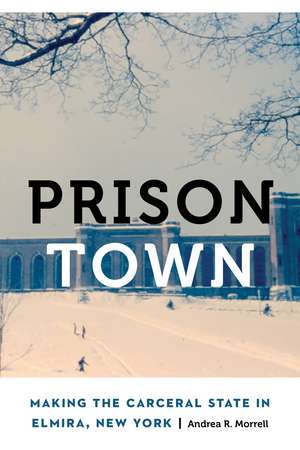Prison Town: Making the Carceral State in Elmira, New York: Anthropology of Contemporary North America
Autor Andrea R. Morrellen Limba Engleză Paperback – iun 2025
In Prison Town Andrea R. Morrell illustrates the converging and shifting fault lines of race and class through a portrait of a prison town undergoing deindustrialization as it chooses the path of prison expansion. In this ethnography, Morrell highlights the contradictions of prison work as work that allows a middle-class salary and lifestyle but trades in other forms of stigma. Guards, prisoners, prisoners’ families, and meager amounts of money and care work travel through spaces of free and unfree via the porous borders between prison and town. As Morrell captures the rapid expansion of the carceral state into upstate New York from the perspective of a small city with two prisons, she demonstrates how the prison system’s racialized, gendered, and classed dispossession has crossed its own porous borders into the city of Elmira.
Preț: 172.28 lei
Nou
Puncte Express: 258
Preț estimativ în valută:
32.96€ • 34.60$ • 27.36£
32.96€ • 34.60$ • 27.36£
Carte nepublicată încă
Doresc să fiu notificat când acest titlu va fi disponibil:
Se trimite...
Preluare comenzi: 021 569.72.76
Specificații
ISBN-13: 9781496243119
ISBN-10: 1496243110
Pagini: 174
Dimensiuni: 152 x 229 mm
Editura: Nebraska
Colecția University of Nebraska Press
Seria Anthropology of Contemporary North America
Locul publicării:United States
ISBN-10: 1496243110
Pagini: 174
Dimensiuni: 152 x 229 mm
Editura: Nebraska
Colecția University of Nebraska Press
Seria Anthropology of Contemporary North America
Locul publicării:United States
Notă biografică
Andrea R. Morrell is an associate professor of anthropology at Guttman Community College, City University of New York.
Cuprins
List of Illustrations
Acknowledgments
Introduction
1. Deindustrialization, Racialized Labor, and Prison Expansion
2. Who Built the Southport Correctional Facility?
3. Doing My Zero to Eight
4. Policing the Carceral State
5. Porous Prison
6. Prison Visiting in a Prison Town
Conclusion: Abolition and a Free New York
Notes
Bibliography
Index
Acknowledgments
Introduction
1. Deindustrialization, Racialized Labor, and Prison Expansion
2. Who Built the Southport Correctional Facility?
3. Doing My Zero to Eight
4. Policing the Carceral State
5. Porous Prison
6. Prison Visiting in a Prison Town
Conclusion: Abolition and a Free New York
Notes
Bibliography
Index
Recenzii
“Prison Town breaks new ground in the study of the carceral state in rural America. Fiercely analytical and with compelling personal throughlines, Prison Town examines Elmira as a set of relationships forged across the porous borders supposedly separating state and capital as well as institution and community. Morrell’s ethnography reveals how Elmirans make sense of their changing community and analyzes the political and economic changes that contoured the town (and other places like it) to accept prisons as legitimate forms of development. In the process, Prison Town sheds new light on the racializing and immiserating consequences of prison building for rural communities.”—Judah Schept, author of Coal, Cages, Crisis: The Rise of the Prison Economy in Central Appalachia
“Though prisons promise economic development to deindustrialized regions, what they produce is misery. Andrea Morrell’s ethnography of Elmira, New York, offers a tender portrait of a bleak place. Through the voices of local residents, prison guards, formerly incarcerated people, town boosters, prisoner advocates, and loved ones visiting prisoners from downstate, she recounts the costs borne by people in her own hometown. Painful and personal, Prison Town reveals how life is broken for people on both sides of the prison walls.”—Christina Heatherton, coeditor of Policing the Planet: Why the Policing Crisis Led to Black Lives Matter
“Highly readable and lucid. Andrea Morrell has produced an urgent, well-researched, empirically rich, and theoretically sophisticated book. Prison Town is an enormous contribution to the subfield of critical carceral studies and anthropology. There are few works of the texture and breadth of this one, which has involved more than thirteen years of research and is augmented by Morrell’s deep familial and social ties to the Elmira community.”—David P. Stein, assistant professor of history at the University of California, Santa Barbara
“Andrea Morrell delivers a poignant plea for prison abolition. Prison Town resonates with her own upbringing in a prison town where her two grandfathers had been prison guards. Importantly, she demonstrates the porousness of prison walls—prison and town leak into each other, so that the prison is a constant presence throughout all life in the town. Her work lives up to the advice she was given by an activist: ‘Make it clear that it’s bad for people on both sides of the prison walls.’. . . Her focus on a single town allows her to make glaringly obvious the machinations of the carceral state, providing a useful tool for prison abolition activists throughout the country.”—Pem Davidson Buck, author of The Punishment Monopoly: Tales of My Ancestors, Dispossession, and the Building of the United States
“Andrea Morrell’s ethnography convincingly demonstrates how ‘carceral reindustrialization’ (attempts to use prison construction as a means of economic development) ultimately failed to expand the local economy and increased immiseration across New York State. With a keen ethnographic eye and empathy for those ‘on both sides of the prison walls,’ she documents how prison work and local discourses about crime reproduced racial inequalities and ideologies of racial difference. While Black and Latine communities were subject to the devastation brought by mass incarceration, a small group of white men traded multiple forms of stigma and being trapped in brutal and boring jobs for the meager advantages of increased incomes. Ultimately, her ethnography is an urgent call to abolish carceral systems that create ‘misery at all scales of human life’ and build a society ‘that centers the needs of all people.’”—Tina Lee, author of Catching a Case: Inequality and Fear in New York City’s Child Welfare System
Descriere
Andrea R. Morrell shows that despite the barriers aimed at separating incarcerated and free residents of Elmira, New York, the town’s two prisons extended far beyond their walls, intricately connecting the two populations.











